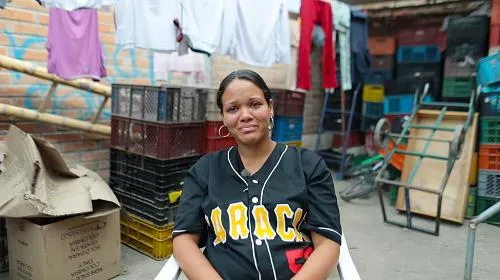LA GUAJIRA, COLOMBIA (June 19, 2019) — Abuse and exploitation of women migrating from Venezuela has reached alarming levels, the leading humanitarian organization CARE has found in a snapshot gender analysis at the Venezuela-Colombia border released today.
The analysis – performed at two checkpoints along the border – found troubling indications of sexual violence perpetrated against women and girls at informal border crossings. In particular, women and teenage girls face extremely high risk – not only of abuse – but also being forced to resort to transactional sex as a means of survival. Additionally, Venezuelan migrants are easy targets for trafficking and exploitation, as they often lack official documentation and have limited awareness of their rights.
“Venezuelans forced to leave their homes as their country implodes are suffering enough already,” said Tatiana Bertolucci, CARE Regional Director of Latin America and the Caribbean. “The humanitarian community urgently needs to ramp up efforts to prevent and respond to the abuse and exploitation of people who are simply searching for better lives for themselves and their families. Women and girls must also be a part of the conversation about their future, and have a say in how they are helped. We simply cannot do this without them and they have already borne the brunt of this crisis.”
CARE calls on the humanitarian community and others responding to the crisis to ensure that the needs of women and girls are understood and that they are addressed appropriately through the response. There is an urgent need to ensure that women and girls’ protection, health and livelihoods are prioritized.
The economic crisis Venezuelans have endured throughout the last years has forced some four million people from their homes. The majority of Venezuelans have settled in neighboring countries where their future is uncertain. There are estimates that around 90% of Venezuelan migrants live under the poverty line.
Food shortages, hyperinflation and the crumbling health system in Venezuela are forcing many pregnant women and girls, HIV-positive individuals, and people with disabilities or chronic disease to migrate to Colombia. As a result, their protection risks multiply exponentially, and in many cases, result in even greater health needs, including sexual and reproductive health.
CARE’s research was completed from May 6-13, 2019 in Colombia and was complemented by secondary data collection prior to and after this period. Data collection was undertaken in Riohacha and Maicao, La Guajira Department and Cúcuta and Puerto Santander, Norte De Santander department – two of the most seriously affected border regions of Colombia – and in Bogota.
CARE calls on Congress to support the Safe from the Start Act, a bipartisan bill that works to address gender-based violence at the onset of a humanitarian emergency so that it can be prevented or addressed early and immediately. Specifically, the Safe from the Start Act formalizes an existing U.S. Government initiative that started in 2013 to address gender-based violence in emergencies – making it stronger and more sustainable, as well as building the capacity of local and international humanitarian organizations to successfully address these concerns. Once introduced, we look forward to working with Congress to ensure this bill is a priority for the millions of women and girls facing humanitarian emergencies around the globe.
ABOUT CARE :
Founded in 1945 with the creation of the CARE Package®, CARE is a leading humanitarian organization fighting global poverty. CARE places special focus on working alongside women and girls because, equipped with the proper resources, they have the power to lift whole families and entire communities out of poverty. That’s why women and girls are at the heart of CARE’s community-based efforts to confront hunger, ensure nutrition and food security for all, improve education and health, create economic opportunity and respond to emergencies. In 2018, CARE worked in 95 countries and reached more than 56 million people around the world.
MEDIA CONTACTS
Vanessa Parra, +1 917-525-0590, vanessa.parra@care.org

